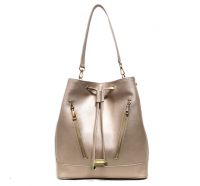Compassion is defined as concern for the suffering of others.
Most people apply compassion in their day to day interactions with other humans. Compassion is also often used to refer to one’s dietary choices, such as eating vegetarian or vegan.
Fashion is many times over looked as an area of one’s life to practice compassion.
However, terms such as eco-friendly, organic, cruelty free, zero waste, made in the U.S.A., and recycled are becoming increasingly popular—especially in the fashion industry. But what do these terms actually mean? And why are they important?
1. Cruelty Free. The term cruelty free and vegan are often used interchangeably in fashion. It means that no animals are harmed and no animal byproducts are used to make the garment or accessory. In other words, the fashion item does not contain any wool, silk, leather, or fur.
Animal farming is one of the most detrimental practices to our planet. By buying animal free fashion, you are ensuring the welfare of the animals and our environment.
2. Organic. Organic is often heard when talking about food. Many people are concerned about the nourishment they put into their bodies being organic, but the fibers they wear are often overlooked. What we put on our bodies is just as important as what we put into our bodies. Not to mention, the environment suffers when we use pesticides and other chemicals to conventionally grow the plants (such as cotton) that are turned into fabric, which is then turned into clothing.
Buying organic is good for you and the planet!
3. Zero Waste. Zero waste is a relatively new term and a really awesome one. Zero waste garments are articles of clothing that are designed and produced creating absolutely no garbage. When the average t-shirt is designed and made, a lot of scrap material is produced. Zero waste garments use every inch of the fabric to make sure that they are not contributing to the landfills filled with scrap fabric.
4. Recycled. Many people separate their garbage from their paper and plastics in order to recycle. Recycled fashion turns trash into new treasures. Whether it be recycling old clothing to make new or coming up with innovative ways to use disposable materials, recycled fashion helps keep materials out of landfills.
5. Made In N.Y.C. Made In America is an increasingly popular term, especially in times of recession. It ensures that we are employing U.S. citizens and creating jobs in order to fuel our economy. Made In N.Y.C. is an important term within the fashion industry. N.Y.C. has been known for its garment industry and is one aspect of the city that makes it unique.
Unfortunately, outsourcing has become cheaper than producing garments in N.Y.C., so many companies have moved their production overseas.
According to the Save the Garment District’s website, in 1960, 95% of clothing sold in the US was made in the US. Now, that figure is down to 5%. This decline has caused the N.Y.C. Garment Industry to suffer, so it is more important than ever to support U.S.A. made clothing and the N.Y.C. Garment Industry.
6. Vintage and Second Hand Clothing. Vintage and second hand shopping is a great and fun way to buy compassionate fashion. It is also a great way to save money when revamping your wardrobe. Often when a person is finished wearing a particular garment, they throw it out.
A plethora of second hand stores are popping up across the country (and if there are none by you, ebay and other online sites are a great way to shop second hand and vintage!). Instead of throwing out clothing and contributing to the waste that we produce, vintage and second hand shopping allows us to give clothing a second life.
Relephant product from Elephant’s mindful marketplace:
Gunas Vegan Purse
Curious where else to get compassionate fashion? Check out sites such as: ShopEthica.com, ShopHelpsy.com, Modavanti.com, and ShopGoodCloth.com.
Some Ethical Designers to check out are:
Miakoda New York, Seamly.com, Djuna Shay, Angela and Roi, Leni Penn, and Nicora Johns.
Relephant Read:
6 Things You Didn’t Know About Fast Fashion.
Author: Julia Ahrens
Apprentice Editor: Melissa Scavetta / Editor: Catherine Monkman
Photo: Yifu Chien via Pixoto
Facebook is in talks with major corporate media about pulling their content into FB, leaving other sites to wither or pay up if we want to connect with you, our readers. Want to stay connected before the curtain drops? Sign up for our curated, quality newsletters below.




Read 7 comments and reply